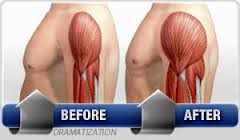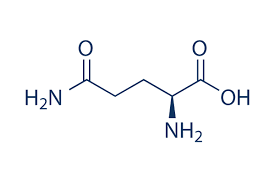 We love the idea that a quick pill or supplement will improve our results, make things happen more quickly or give us an extra boost. Whether it’s muscle gain, fat loss or even a new job . . . if there is an easy button, we want to push it!
We love the idea that a quick pill or supplement will improve our results, make things happen more quickly or give us an extra boost. Whether it’s muscle gain, fat loss or even a new job . . . if there is an easy button, we want to push it!
Well, it just might be that creatine is one of those easy buttons!
Creatine is actually a naturally occurring amino acid found in meat and fish and which the body uses for energy. First it is converted to one of two other chemicals and then stored in the muscle for use later.
During high-intensity exercises that are short duration (not endurance training) the phosphocreatine (one of those chemicals) is converted to ATP, something your body uses for energy. Supplementing with creatine will increase those energy stores at the cellular level and theoretically help you to work harder and longer.
In most of the human studies the most positive results have been in people around 20 years of age. It doesn’t appear to improve performance in other types of exercise, like running or rowing, but does seem to have positive benefits in strength training and lifting.
When taken in higher doses it can trigger kidney damage and can stop the body from making it’s own creatine over time.
 Glutamine is another supplement that is popular with body builders. It actually accounts for the largest amount of amino acids in the body. We can make enough of our own glutamine for regular needs, but when the body is under stress, like exercise, surgery, infections or injury, we may need more.
Glutamine is another supplement that is popular with body builders. It actually accounts for the largest amount of amino acids in the body. We can make enough of our own glutamine for regular needs, but when the body is under stress, like exercise, surgery, infections or injury, we may need more.
Glutamine helps to eliminate ammonia in the body. Ammonia is a common waste product from metabolism, and it helps the immune system to function optimally. Athletes who participate in endurance events may experience positive effects of using a glutamine supplement because of the increased amount of ammonia produced from an endurance length athletic activity, such as marathons.
There are some interactions with medications so it is wise to check with your physician and pharmacist to determine if it will interfere with any underlying medical condition or medications you may already be taking. Glutamine will cause problems in people who suffer from kidney disease, liver disease or Reye’s Syndrome.
Although the names are similar glutamine is not the same as gluten, glutamate, glutamic acid and monosodium glutamate.
Nitric Oxide is a necessary component of your overall health. Much like glutamine and creatine, your body needs nitric oxide. It is crucial to maintain a healthy blood pressure, prevent athrosclerotic plaques in the arteries and helps to modify and maintain the immune system which protects you from disease and illness.
Nitric Oxide enhances blood flow when regulating your blood pressure. Your smooth muscle cells in the blood vessels relax and dilate so your blood
 pressure goes down. As your blood flows freely through your muscles and body, all other functions also function better.
pressure goes down. As your blood flows freely through your muscles and body, all other functions also function better.
Research from the United Kingdom has also found that when your skin is exposed to sunlight nitric oxide is released into your blood. Just one more reason to get sun!
Increasing the amount of circulating nitric oxide in the body is another weapon in the arsenal of supplements available to body builders. By using L-arginine and L-citruline supplementation, you are able to boost the circulating nitric oxide. Arginine is lost during exercise and it is needed for the production and use of nitric oxide. Through supplementation the loop is restored and the athlete may experience better workouts and faster recoveries.
However, as in using all other supplements, vitamins or adding any additional chemical to the body, check with your physician and pharmacist to be sure it doesn’t interfere with any underlying medical condition or medication you are currently taking.
Resources:
Unviersity of Maryland Medical Center: Creatine
http://umm.edu/health/medical/altmed/supplement/creatine
Mens Health: Creatine: Side Effects, What it is, what it does
http://www.menshealth.com/nutrition/creatine-side-effects-what-it-what-it-does
University of Maryland Medical Center: Glutamine
http://umm.edu/health/medical/altmed/supplement/glutamine
Mercola: Gultamine Supplementation Helpful or Harmful?
http://articles.mercola.com/sites/articles/archive/2004/05/01/glutamine.aspx
Nutrition Express: What is Nitric Oxide and How does it work
http://www.nutritionexpress.com/showarticle.aspx?articleid=286
Mercola: New study finds sunlight boosts nitric oxide production
http://articles.mercola.com/sites/articles/archive/2013/07/15/sun-exposure.aspx
American Journal of Physiology: Nitric Oxide, superoxide and perosynitrite: the good, the bad and the ugly
http://www.ncbi.nlm.nih.gov/pubmed/8944624
PubChem: Nitric Oxide
http://pubchem.ncbi.nlm.nih.gov/summary/summary.cgi?cid=145068


Leave a Reply